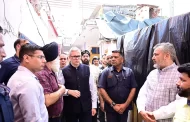In a first, Maharashtra is witnessing a bizarre campaign by the BJP for the state Assembly on the back of its Kashmir policy and what it would like to do with Pakistan

With barely a week to go to polls in Maharashtra, there is a marked lack of enthusiasm is not just opposition ranks but also in the BJP rank and file, perhaps because many of their stalwarts have been denied tickets, including more than one sitting ministers and a couple of former ministers in the Devendra Fadnavis cabinet.
Another explanation in circulation is that perhaps the party workers have sensed the palpable anger in their traditional voter base – the traders and business class and, by extension, the Gujarati community as a whole.
Up until the Lok Sabha elections this summer, these communities, despite their myriad problems, were firmly behind the BJP and Narendra Modi. But since the May election results, it has become obvious to them that it is the Modi government which is responsible for their small, medium and even large enterprises going bust but, what’s more, the government is both incapable and incompetent in resolving the issues.
In the midst of a severe financial crunch, the collapse of more than one bank in Mumbai that has affected Modi voters as well as the others, and the failure of the government to come up with lasting solutions, it is clear they are not as enamoured of Modi as they were earlier. Yet it is difficult to gauge whether they will still go ahead and vote for Modi or hedge their votes. But they do not have too many options either.
Although BJP and the Shiv Sena are in an alliance, each is trying to maximise its gains to secure an upper hand over the other. For the Shiv Sena, it is more a battle of survival than for the BJP, which is seeking to banish its ally to the sidelines once and for all.
The BJP also seems to have nothing to write home about, deploying the same tricks it did this summer to cover up its failures in government and its glaring inadequacies. So the issues raised by Amit Shah, JP Nadda , Yogi Adityanath and others are all focused on Article 370 and the alleged failures of the Congress, which has not been in government either in Maharashtran or the Centre these past five years.
In the face of all this ennui, what is now beginning to worry the candidates is the timing of the elections. Schools and colleges have adjusted their timetables to suit the elections. With teachers on compulsory poll duty, they will be done and dusted with their exams by the weekend before the polling day on October 21.
Soon after counting day on October 24, they break for Diwali vacations which have come early (from October 20) because of the election schedule.
In view of the already visible lack of enthusiasm among the voters, candidates of all political parties are worried that parents and young voters will take off on vacation before the polling day, upsetting their calculations and affecting their margins.
The situation has not been lost on even the common people who have begun to wonder if there really is an election underway. With virtually no hoardings and bunting, they do not yet know who their candidates from respective political parties are and who they should vote for.
The focal point of interest therefore are the potential victory margins of high profile candidates like Chief Minister Devendra Fadnavis, Shiv Sena scion Aaditya Thackeray, contesting from Worli in Mumbai (the first Thackeray to do so, being groomed to become deputy chief minister after this election) and that of former chief minister Ashok Chavan who lost the Lok Sabha polls from his home turf of Nanded this summer.
And, of course Raj Thackeray of the Maharashtra Navnirman Sena who is running a rather subdued election campaign this season but could play spoiler to both the Shiv Sena and the BJP with 150 of his men in the fray for 288 seats in the assembly. On those margins, of victory or defeat, will depend the political future of not just the candidates but also their political parties.
source: NH








































